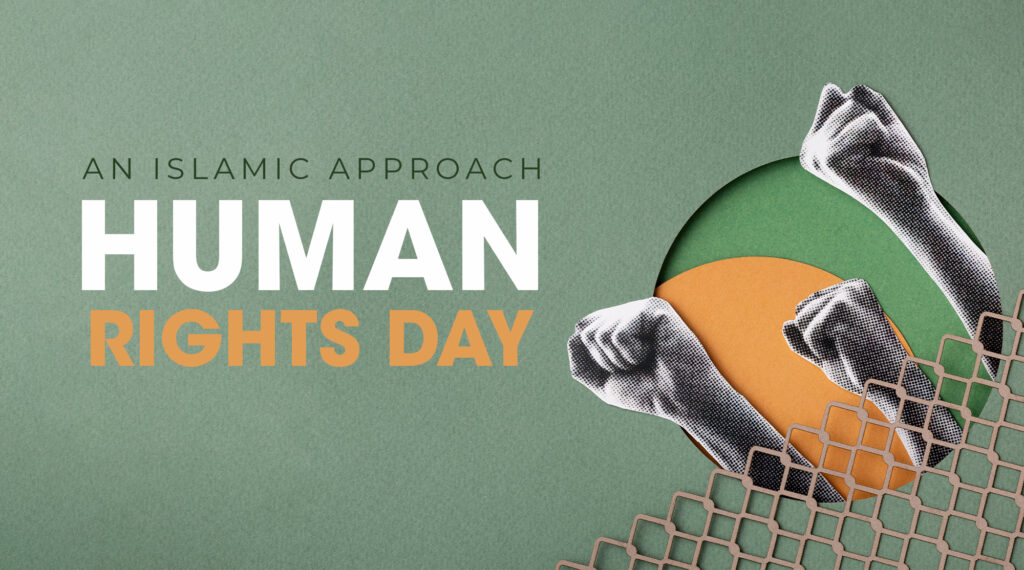Celebrating Human Rights Day – An Islamic Approach

December 10, 2023, marks the 75th anniversary of one of the world’s most groundbreaking global pledges: the Universal Declaration of Human Rights (UDHR). It is an international document adopted by the United Nations General Assembly that enshrines the rights and freedoms of all human beings. It was accepted by the General Assembly on 10 December 1948 in Paris, France. A foundational text in the history of human and civil rights, the Declaration consists of 30 articles detailing an individual’s “basic rights and fundamental freedoms” and affirming their universal character as inherent, inalienable, and applicable to all human beings.
This piece will focus on the most significant term in this document, namely “Human Dignity,” and examine the Islamic perspective on it.
The UDHR preamble starts with the “recognition of the inherent dignity and the equal and inalienable rights of all members of the human family” as “the foundation of freedom, justice, and peace in the world.” Article 1 begins with this sentence: “All human beings are born free and equal in dignity and rights.” This term is repeated in Articles 22 and 23. However, the Declaration is silent about the origin of this honor. In the drafting committee, as well as in the negotiations during its approval in the General Assembly, suggestions were made in this regard, including mentioning God as the bestower of this honor to humans. Another suggestion was to introduce “nature” as the source of human dignity.
On the one hand, the communist countries were against the introduction of divine origin for human dignity; on the other hand, all delegations wanted to agree on a document. As a way out of the deadlock, it was agreed to focus on the inherent dignity of the human being—regardless of its origin and root. Although this pragmatic approach was agreed upon, there are still some problems and questions. For instance, in both the Third Committee debate on drafting the declaration and later in the General Assembly debate, the Netherlands delegate, Dr. J. H. van Roijen, objected, stating that “man’s divine origin and immortal destiny had not been mentioned in the declaration, for the fount of all those rights was the Supreme Being, who laid a great responsibility on those who claimed them. To ignore that relationship was almost the same as severing a plant from its roots or building a house and forgetting the foundation.”1
From the Islamic view, human dignity is a divine gift to all human beings, as the Holy Qur’an says: “Indeed, We have conferred dignity on the children of Adam…” [17:70]. This is the clearest verse of the Qur’an in this regard. But other verses about the place of man in existence are also significant. For example, verses that describe humans as God’s trustees on the earth [2:30], those that highlight humans as bearers of the divine spirit [15:29] and [38:72].
Another example of Islamic teachings about the dignity of humankind can be found in the guidance for governance that Imam Ali (AS) provided to his appointed ruler for Egypt, Malik al-Ashtar: “Fill your heart with mercy, love, and kindness towards people. Don’t consider people as your booty like a wild animal because they are not out of two categories: either they are brothers with you in religion, or they are equal with you in creation.”2
These verses and Islamic teachings are applied to all human beings, including asylum seekers, refugees, indigenous peoples, prisoners, exiles, stateless nations, people living under occupation, and those in emergencies. However, the critical question is: Do they have access to the outcomes and benefits of such honor
The wars, genocides, forced migrations, and discrimination occurring in recent decades, including these days around the world, specifically in Palestine indicate that humanity is far from a world where everyone leads dignified lives, free from poverty, fear, oppression, and discrimination. Achieving such a desirable world requires compassionate efforts and immediate action. Divine and spiritual motivations can unite us all and foster a collective determination for the well-being of humanity, and the protection of nature as God’s creation.
1. The Universal Declaration of Human Rights: A History of Its Creation and Implementation (1948–1998), By M. Glen Johnson & Janusz Symonides; Preface by Federico Mayor, Director-General of UNESCO (UNESCO, Paris, 1998 ISBN 92-3-103513-4), P. 43.
2. Nahj al-Balagha, letter 53 (Imam Ali’s letter to Malik Ashtar).

Leave a Comment:
You must be logged in to post a comment.